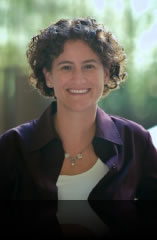Roads Taken and Not Taken: Pamela Jay Gottfried '87

Pamela Jay Gottfried '87
Details
At the age of 6, I was asked what I wanted be when I grew up. I answered earnestly,“A fireman, a rabbi or President of the United States.” I was certain even then that my destiny was to work in a field considered unsuitable and inappropriate for girls. But when I arrived at Haverford, I abandoned these professional aspirations to explore a variety of other disciplines. Since I always had a facility with languages and great enthusiasm for words, I considered a major in Spanish. I also took classes in creative writing and linguistics, and spoke to a career counselor about studying speech pathology. It wasn't until the spring of my sophomore year that I considered the rabbinate a viable option. That was the year the Conservative Movement's Jewish Theological Seminary ordained its first female rabbi.
After declaring a major in History of Religions at Bryn Mawr, I worked tirelessly toward my goal. I spent the summer before my senior year taking an intensive Hebrew language course at the seminary and memorizing the subway stops on the Upper West Side. In the fall, I led High Holiday services and began teaching in the Hebrew school at a small synagogue on the Main Line. I also began observing the Sabbath and praying daily. My suitemates were supportive of my decision; they kept me caffeinated and focused while I wrote my 100-page senior thesis. I was accepted to rabbinical school in March of '87 and prepared to leave the arboretum for the city.
During my years at the seminary, I explored different career options within the rabbinate and planned to work with college students, only to be disappointed when there were no job openings in New York the year I was ordained. I spent another year taking courses in Talmud, but couldn't imagine working in solitude on a doctoral dissertation, so I decided to leave the Ph.D. program to serve as the campus rabbi of a Jewish day school. Because mine was a newly created position, I was able to tailor the job description to suit my talents and interests, which included teaching, leading prayers, and telling stories to elementary and middle school students. I thrived in this loud, busy work environment and—with the exception of one year in a pulpit—spent the first 15 years of my rabbinate in schools.
As a rabbi and teacher, I was required to write sermons, journal articles and curricular materials. I always enjoyed this aspect of my work and wanted to be more than an“incidental writer.” However, I knew that becoming an“intentional writer” would demand my undivided attention and an abundance of quiet time that was sorely lacking in my life. The unrelenting pace of the school schedule followed me home, where I was raising three children and grading papers late into the night. I wanted to write a book, but I didn't think I could complete such an enormous task while juggling so many commitments. I had never considered the possibility of being less busy, though, because I enjoyed the human contact and structure that working in a school provided. This was the rabbinate I had envisioned and achieved.
Then my career took an unforeseen turn: I lost my job. Although I was concerned about finding another job and paying the bills, I seized the opportunity to write for many uninterrupted hours while my children were at school. I began posting short essays that I had written during my tenure at the high school to a blog I'd started. Each essay—originally written to help non-Jewish teachers learn about Judaism—included a Yiddish or Hebrew word that illustrated a Jewish concept. The demanding process of revising more than 100 essays allowed me to envision myself as a writer. Soon the collection was transformed into a manuscript that would eventually become my first book, and within six months I had decided not to return to full-time work in a school. Instead, I chose the solitary life that I had abandoned when I left graduate school.
If you had told me 25 years ago, as I was leaving Haverford for New York City, that I would find such tremendous satisfaction sitting alone in my home office and writing, I would have been incredulous. Some days, I still cannot believe my good fortune to have discovered creative outlets and intellectual challenges that I would have missed if I had not pursued this midcareer adjustment. Perhaps the greatest revelation of my rabbinate is that my path to adulthood was not straightforward and predictable, but rather filled with wonderful surprises.
Gottfried is a rabbi, parent, teacher and author. Her first book, Found in Translation: Common Words of Uncommon Wisdom, is now available in paperback. She is currently at work on her second book, while serving as the interim rabbi at a synagogue in Macon, Ga.



